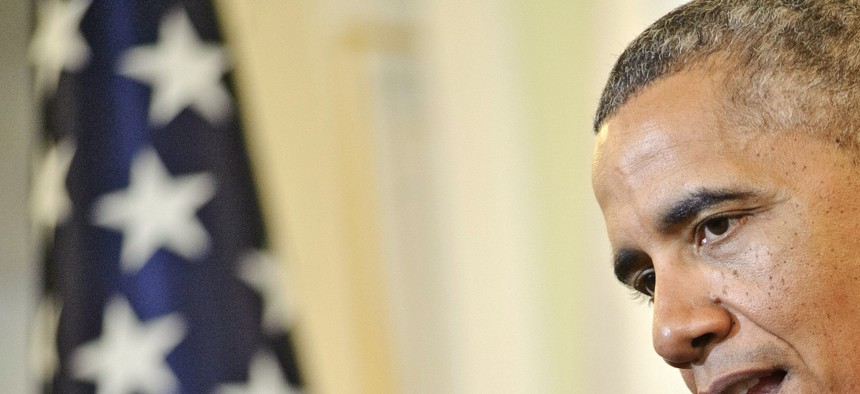
State Department
Explaining Barack Obama's Terrible Political Summer
For Democrats, the good news is that there doesn't appear to be an overwhelming Republican tide this year; the bad news is that Democrats could well lose the Senate even without such a wave
Now that Labor Day is behind us, the most remarkable thing about this midterm election is how little has changed since Memorial Day. In the closest and most crucial contest, for control of the U.S. Senate, only the race in Kansas looks fundamentally different than it did three months ago. Strategists in both parties have been asking, "What's the matter with Kansas?" The Democratic nominee's sudden decision to withdraw from the race this week will make it more competitive. Republican Sen. Pat Roberts, who sustained some damage in his primary, will now face independent candidate Greg Orman. Orman has the backing of some of the moderate GOP leaders in the state. But that's the only major change of the summer, despite more than a billion dollars already spent in what the experts at Kantar Media/CMAG estimate will end up being $5.5 billion to $6.5 billion in total campaign expenditures on all levels this election cycle.
One question has become more pressing as Election Day nears: Where is the Republican wave? For Democrats, the good news is that there doesn't appear to be an overwhelming Republican tide this year; the bad news is that Democrats could well lose the Senate even without such a wave. Six of the most competitive races are Democratic-held seats in states that Mitt Romney carried by 14 points or more. With a map like that, Republicans don't need to dominate the country; they just have to win some select states.
Among the three most vulnerable Democratic seats—those in Montana, South Dakota, and West Virginia—the biggest change since May is appointed Sen. John Walsh's withdrawal in Montana after allegations of plagiarism surfaced. While this is embarrassing for him and Democrats, Walsh had little chance of winning anyway, so that doesn't amount to a major development in my book. Republicans still look likely to take the other two.
Only one of the seven Democratic toss-up seats has seen any real change over time—and that's in the GOP's favor. In Iowa, Democratic Rep. Bruce Braley's small lead over Republican Joni Ernst has gotten, well, smaller—to the point of basically disappearing. In Michigan, the other toss-up state where Democrats had something of an edge in late spring, Democratic Rep. Gary Peters still barely outpolls former Secretary of State Terri Lynn Land, the GOP standard-bearer.
The other five Democratic toss-up seats—those of Mark Begich (Alaska), Mark Pryor (Arkansas), Mark Udall (Colorado), Mary Landrieu (Louisiana), and Kay Hagan (North Carolina)—were essentially even when kids got out of school for the summer, and still are as classes resume. Hagan probably pulled a few points ahead of state House Speaker Thom Tillis, her GOP challenger, late in the summer as the highly polarizing state legislative session was grinding to a discordant end. But now that it is over, it appears that the race has tightened up again. Landrieu is running well ahead of Rep. Bill Cassidy, the likely GOP nominee in Louisiana. But with nine candidates running—three Republicans, five Democrats, and one Libertarian—the odds of the leader on Nov. 4 coming in below 50 percent are pretty good. Polling indicates that Landrieu's lead turns into a dead heat in a runoff against Cassidy.
While the two vulnerable Republican seats, in Kentucky and Georgia, remain so, the GOP has pulled out front, as we suspected back in the spring. Senate Minority Leader Mitch McConnell seems to have put a tiny bit of daylight between himself and Secretary of State Alison Lundergan Grimes, his challenger in Kentucky. A very disciplined McConnell campaign, along with the Democrat's joint liabilities of President Obama and the Environmental Protection Agency's "war on coal," have combined to boost the incumbent's odds. Coal in Kentucky can be seen as analogous to energy in Louisiana: Even though most voters' jobs are not directly linked to coal in Kentucky or oil and gas in Louisiana, threats to those industries serve as proxies for perceived Democratic hostilities toward both states. There is little doubt that if Landrieu, who's the Senate Energy Committee chairwoman, were able to do what she wanted on oil and gas issues, she would be in a stronger position for reelection. But Landrieu's ability to leverage that potentially key chairmanship is severely limited by the very different views on energy policy held by Senate Majority Leader Harry Reid and the Obama administration.
In Georgia, where Republican Sen. Saxby Chambliss stepped aside and created an open seat, his wannabe GOP successor, former Reebok and Dollar General CEO David Perdue, appears to be edging ever so slightly ahead of Democrat Michelle Nunn, the former head of the Points of Light Foundation and daughter of former Sen. Sam Nunn. Like Virginia and, to a lesser extent, North Carolina, Georgia is becoming less of a GOP lock thanks largely to demographic changes, but it has a way to go before it becomes a purple state.
That leaves no fewer than nine very close races, at least half of them headed toward photo finishes. But three Democratic-held seats are already gone, and party strategists see seven more teetering on the edge, compared with just two for Republicans. Given that equation, you'd have to bet on the GOP.
This article appears in the September 6, 2014 edition of National Journal Magazine as The Non-Wave Election.
NEXT STORY: White House Sends Spending Wish List to Congress






